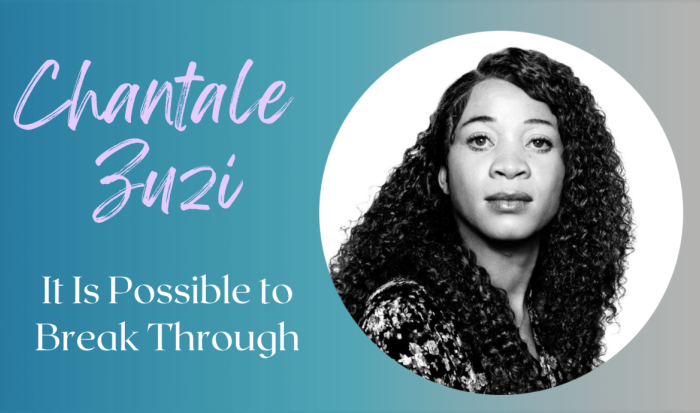
Chantale Zuzi recently asked the QCC community what it means to be a refugee and how can we look at displacement from a place of compassion. Zuzi survived violence in the Democratic Republic of the Congo and after living in a refugee camp, went on to create an organization that advocates for education and has been creating positive changes for young refugees.
In her lecture "It is Possible to Break Through," sponsored by the Psi Beta & Psychology Club and the Social Justice Speaker Series, Zuzi recounted her incredible journey of resilience, hope and the power of education.
When Zuzi was 13 and living in the Democratic Republic of Congo, there was a massacre in her village and both of her parents were killed. Along with her nine siblings, she was sent to the Rwamwanja Refugee Settlement in Uganda. Approximately 70,000 people are currently living at Rwamwanja. Zuzi described life in the camp, where people slept in makeshift tents and food and water were accessed by waiting in long lines. Food came once a month from the United Nations and had to be carefully rationed.Water had to be boiled to make it safe for drinking.
"Before I left my life, I didn’t know what a refugee camp was like. Just what I saw on TV and movies. I couldn’t relate until I became one," said Zuzi. "We lost the place of safety that we once had. We lost everything. Anyone can become a refugee."
Zuzi described time in the camp as a state of constant fear. There was no privacy and gathering wood for fires could put girls at risk of sexual assault from men in the camps. While there were schools set up in Rwamwanja, five primary schools and one secondary school, Zuzi noted that survival was the main priority and education was an afterthought.
To add to their struggles, Zuzi and two of her sisters have albinism, and in their culture many viewed them as outcasts. Traditionally, people with albinism were sacrificed, and there were no accommodations in school for their vision impairments.
Through it all, Zuzi maintained hope. She described herself as a daydreamer who would envision herself leaving the camp so that she could help others. Zuzi became active in advocating for girls and people experiencing albinism and began working with the United Nations. The Ugandan government was not supportive of her advocacy so for her safety, she went to Kenya after three years living in Rwamwanja.
In Kenya, she gained more access to education, which continued to motivate her to make change. Her siblings remained in the camp during her time in Kenya, but after a couple of years she was given a placement for her and her siblings in Worcester, MA.
At first it was difficult to adjust to life in the U.S. She didn't know English and the weather was much colder than she was used to; however, Zuzi persevered and not only graduated high school with honors, but also enrolled in Wellseley College to study political science so she could continue her advocacy work.
"Reflecting on my journey, I dreamed of creating the same learning opportunity for other refugees," Zuzi said.
She wanted to do more than just fundraising, so she started a nonprofit called Refugee Can Be, which works to provide education and resources for girls at Rwamwanja. In 2022, she went back to the camp to speak with girls and young women there which led to the nonprofit's plan of construction a secondary school outside of the camp.
"They said they want education and safety and we have to listen to the voices of refugees themselves. I don't want to dream for them, I want them to dream for themselves. In the camp, we're so focused on surviving, but thriving is the hardest part. While they had good intentions, no one ever asked what I wanted," said Zuzi.
Zuzi offered other ways that people can help refugees such as donating to organizations that are doing work on the ground, voting for candidates who support refugee legislation and viewing those coming from other countries as people, not just refugees. She noted that there is a lot of misunderstanding about who refugees are, so sharing her story can be powerful to work against those misconceptions.
"It took access to education and thousands of people’s contributions to a support system. Now it’s my turn to help refugees realize their own dreams. A refugee can be anything."
To hear more details of her story, watch Zuzi's TEDTalk
